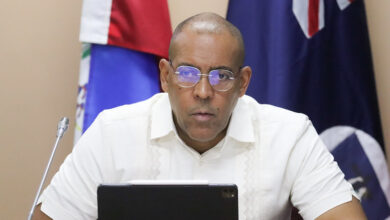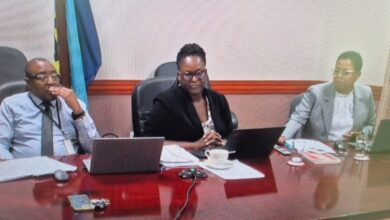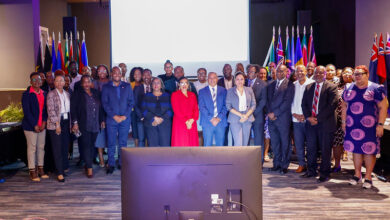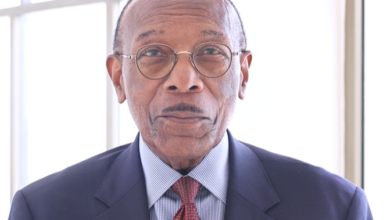I welcome you all to this Forty-First Meeting of the Council for Trade and Economic Development (COTED).
I am sure you will join me in extending a special welcome to the Her Excellency Sieglien Burleson, Minister of Trade and Industry of Suriname and the Honourable Paula Gopee-Scoon, Minister of Trade and Industry of Trinidad and Tobago. Minister Burleson, immediately as you join us you have been elevated to the Chair. I am sure your wide experience in matters of trade, within the private sector, and in building competitiveness, among other things, will certainly be of great benefit to the deliberations of this Council. Thank you for agreeing to Chair this Meeting.
Minister Gopee-Scoon, you are no stranger to us in the Community, having served previously in the Council for Foreign and Community Relations (COFCOR). That service and your professional background in legal and financial services will also be of great assistance to this Council. Welcome back, Minister.
I also want to formally introduce to the COTED, the new Assistant Secretary-General for Trade and Economic Integration, Mr Joseph Cox. Mr Cox has a background in Economics and experience in the private and public sectors. His expertise includes Economic Research, Policy Advocacy, Operations Management, and Market Analysis. Prior to joining us, he was Executive Director of the Growth Secretariat at the Planning Institute of Jamaica.
Honourable Ministers, in looking at the Agenda for the next two days, I am particularly pleased that a Special Session with the Private Sector has been arranged. Since assuming office as Secretary-General, I have been advocating for the greater involvement of the private sector in the work of this Council. The importance of this involvement cannot be over-emphasised, given the Community’s commitment to boost growth and employment, as underlined in our Strategic Plan.
The Private Sector is a critical partner with Governments to stimulate economic growth in CARICOM. That partnership is integral to the formulation of public policy for regional and national development, in particular in the areas of production and trade, and investment and finance.
The CARICOM Secretariat embarked on a consultancy with Caribbean Export to examine the state of Public Private Dialogue within the Region, with a view to developing a road map for improved dialogue towards regional economic development. Building on, and in support of the work we have done with Caribbean Export, the Secretariat is also working with Compete Caribbean to define an agenda for regional business climate reform.
Strengthening the public-private linkage will therefore require a deepening of the consultative modes currently used for engagement with the Private Sector. Key to facilitating this necessary dialogue is a representative regional body for the private sector which can reflect the views of the entire spectrum of interests. I am sure that we all look forward to the establishment of the long-awaited Caribbean Business Council (CBC).
Ministers, a competitive and vibrant private sector is critical to the continued strengthening of the CARICOM Single Market and Economy (CSME). The CSME is the main tool for our Community to build its economic resilience and to provide a platform for further integration into the global economy. However, there are some areas in the CSME which need to be addressed in order to strengthen the platform on which to base our interface with external partners. These areas include certain elements of the regimes for trade in goods, the application of technical measures, in particular SPS, trade in services and services regulations, investment, and competition policy, among others.
As you consider the Future Direction of CARICOM’s External Trade Policy and Strategy at this Meeting, the objectives of that Policy must be grounded in the Region’s developmental imperatives. In the language of the Strategic Plan, it must contribute to the building of economic and social resilience. Critically, there must also be co-ordination between external trade strategies and the Community’s foreign policy outreach. Such a Policy must, therefore, have the effect of placing regional enterprises, of all scales of operation, in the best position to take advantage of, and participate in global and regional value chains.
We need a dynamic regional programme of trade and investment promotion to complement the national programmes. This, along with trade research and market information, will help to further identify CARICOM’s opportunities in the global economy. This Meeting will have an opportunity to examine a strategy for regional investment promotion prepared by Caribbean Export, which benefitted from consultation throughout our Community.
Ministers, a major factor that affects our competitiveness, and therefore our ability to maximise opportunities both within our Single Market and externally, is the health of our workforce. Our Region has consistently been recorded among the highest mortality rates related to Non-Communicable Diseases (NCDs) of any region in the Americas, with heart diseases and diabetes responsible for the greatest number of deaths. More than half the adult population has the presence of at least three of the four major risk factors for cardiovascular diseases and diabetes.
Over the last fifty years, there has been an exponential rise in obesity and diet-related NCDs in the Caribbean. More than 60 percent of Caribbean adults are overweight. An increasing cause for concern is the rates of overweight and obesity in Caribbean children over recent decades. Seven to 12 percent of preschool-aged children in the Region are estimated to be overweight or obese, and up to 14 percent of adolescents in some Member States are obese.
These disturbing statistics point to the need for cross-sectoral action to address the burden of unhealthy diets and related NCDs, and their impact on productivity and expenditure – both public and private. In particular, some of the areas that lend themselves for action involving the COTED, relate to mandatory nutrition labelling on all packaged foods; recommendations on measures to encourage the consumption of healthier foods; and disincentives to consumption of less healthy foods. Action should also be taken to incentivize production of, and improve productivity for, healthy, local foods.
The seriousness of this issue cannot be overstated. This Council must join this fight to ensure that there is a healthy workforce to boost competitiveness and productivity by reducing absenteeism in the work place, and the associated costs to the public and private purse with respect to health care.
Already, you have agreed to work jointly with your colleague Ministers in the Council for Human and Social Development (COHSOD) to address the huge and increasing diet-related health and economic burden in the Community. To guide our discussions today, the Caribbean Public Health Agency (CARPHA) has prepared a brief which sets out the need for a comprehensive, coordinated, regional approach to combat the challenge.
Honourable Ministers, delegates, those three areas by themselves represent a formidable task before you over the next two days. But, as you are aware there is much more to be covered, including matters related to intra-regional trade, the CSME Application Processing System (CAPS), advancing the Regional Public Procurement Regime, the CARICOM Development Fund (CDF), and the state of trade negotiations with our partners including Cuba. The potential is there in this Agenda for decisions to be taken which would have far-reaching, beneficial effects on our Community. I am confident that you have the vision and commitment to realise that potential.
I thank you.I am sure you will join me in extending a special welcome to the Her Excellency Sieglien Burleson, Minister of Trade and Industry of Suriname and the Honourable Paula Gopee-Scoon, Minister of Trade and Industry of Trinidad and Tobago. Minister Burleson, immediately as you join us you have been elevated to the Chair. I am sure your wide experience in matters of trade, within the private sector, and in building competitiveness, among other things, will certainly be of great benefit to the deliberations of this Council. Thank you for agreeing to Chair this Meeting.
Minister Gopee-Scoon, you are no stranger to us in the Community, having served previously in the Council for Foreign and Community Relations (COFCOR). That service and your professional background in legal and financial services will also be of great assistance to this Council. Welcome back, Minister.
I also want to formally introduce to the COTED, the new Assistant Secretary-General for Trade and Economic Integration, Mr Joseph Cox. Mr Cox has a background in Economics and experience in the private and public sectors. His expertise includes Economic Research, Policy Advocacy, Operations Management, and Market Analysis. Prior to joining us, he was Executive Director of the Growth Secretariat at the Planning Institute of Jamaica.
Honourable Ministers, in looking at the Agenda for the next two days, I am particularly pleased that a Special Session with the Private Sector has been arranged. Since assuming office as Secretary-General, I have been advocating for the greater involvement of the private sector in the work of this Council. The importance of this involvement cannot be over-emphasised, given the Community’s commitment to boost growth and employment, as underlined in our Strategic Plan.
The Private Sector is a critical partner with Governments to stimulate economic growth in CARICOM. That partnership is integral to the formulation of public policy for regional and national development, in particular in the areas of production and trade, and investment and finance.
The CARICOM Secretariat embarked on a consultancy with Caribbean Export to examine the state of Public Private Dialogue within the Region, with a view to developing a road map for improved dialogue towards regional economic development. Building on, and in support of the work we have done with Caribbean Export, the Secretariat is also working with Compete Caribbean to define an agenda for regional business climate reform.
Strengthening the public-private linkage will therefore require a deepening of the consultative modes currently used for engagement with the Private Sector. Key to facilitating this necessary dialogue is a representative regional body for the private sector which can reflect the views of the entire spectrum of interests. I am sure that we all look forward to the establishment of the long-awaited Caribbean Business Council (CBC).
Ministers, a competitive and vibrant private sector is critical to the continued strengthening of the CARICOM Single Market and Economy (CSME). The CSME is the main tool for our Community to build its economic resilience and to provide a platform for further integration into the global economy. However, there are some areas in the CSME which need to be addressed in order to strengthen the platform on which to base our interface with external partners. These areas include certain elements of the regimes for trade in goods, the application of technical measures, in particular SPS, trade in services and services regulations, investment, and competition policy, among others.
As you consider the Future Direction of CARICOM’s External Trade Policy and Strategy at this Meeting, the objectives of that Policy must be grounded in the Region’s developmental imperatives. In the language of the Strategic Plan, it must contribute to the building of economic and social resilience. Critically, there must also be co-ordination between external trade strategies and the Community’s foreign policy outreach. Such a Policy must, therefore, have the effect of placing regional enterprises, of all scales of operation, in the best position to take advantage of, and participate in global and regional value chains.
We need a dynamic regional programme of trade and investment promotion to complement the national programmes. This, along with trade research and market information, will help to further identify CARICOM’s opportunities in the global economy. This Meeting will have an opportunity to examine a strategy for regional investment promotion prepared by Caribbean Export, which benefitted from consultation throughout our Community.
Ministers, a major factor that affects our competitiveness, and therefore our ability to maximise opportunities both within our Single Market and externally, is the health of our workforce. Our Region has consistently been recorded among the highest mortality rates related to Non-Communicable Diseases (NCDs) of any region in the Americas, with heart diseases and diabetes responsible for the greatest number of deaths. More than half the adult population has the presence of at least three of the four major risk factors for cardiovascular diseases and diabetes.
Over the last fifty years, there has been an exponential rise in obesity and diet-related NCDs in the Caribbean. More than 60 percent of Caribbean adults are overweight. An increasing cause for concern is the rates of overweight and obesity in Caribbean children over recent decades. Seven to 12 percent of preschool-aged children in the Region are estimated to be overweight or obese, and up to 14 percent of adolescents in some Member States are obese.
These disturbing statistics point to the need for cross-sectoral action to address the burden of unhealthy diets and related NCDs, and their impact on productivity and expenditure – both public and private. In particular, some of the areas that lend themselves for action involving the COTED, relate to mandatory nutrition labelling on all packaged foods; recommendations on measures to encourage the consumption of healthier foods; and disincentives to consumption of less healthy foods. Action should also be taken to incentivize production of, and improve productivity for, healthy, local foods.
The seriousness of this issue cannot be overstated. This Council must join this fight to ensure that there is a healthy workforce to boost competitiveness and productivity by reducing absenteeism in the work place, and the associated costs to the public and private purse with respect to health care.
Already, you have agreed to work jointly with your colleague Ministers in the Council for Human and Social Development (COHSOD) to address the huge and increasing diet-related health and economic burden in the Community. To guide our discussions today, the Caribbean Public Health Agency (CARPHA) has prepared a brief which sets out the need for a comprehensive, coordinated, regional approach to combat the challenge.
Honourable Ministers, delegates, those three areas by themselves represent a formidable task before you over the next two days. But, as you are aware there is much more to be covered, including matters related to intra-regional trade, the CSME Application Processing System (CAPS), advancing the Regional Public Procurement Regime, the CARICOM Development Fund (CDF), and the state of trade negotiations with our partners including Cuba. The potential is there in this Agenda for decisions to be taken which would have far-reaching, beneficial effects on our Community. I am confident that you have the vision and commitment to realise that potential.
I thank you.






